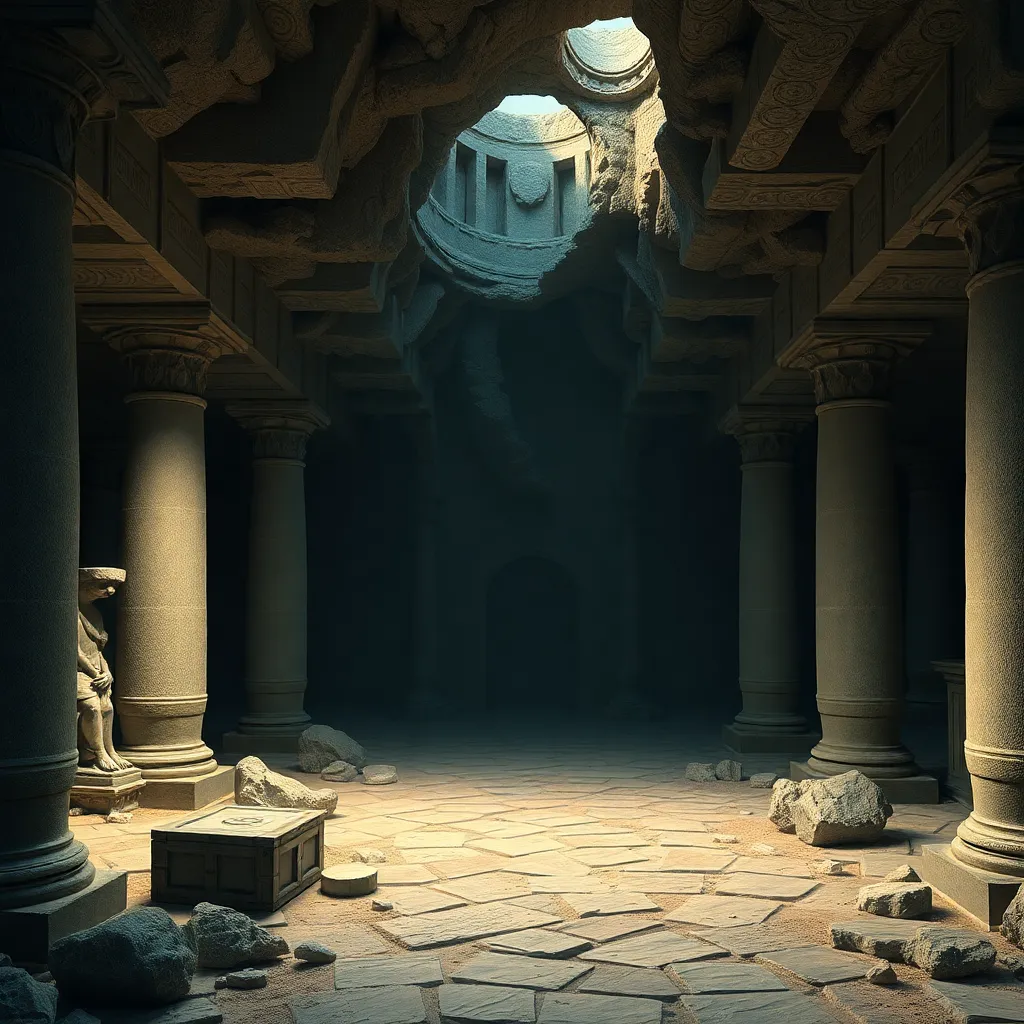The Underworld in Homer’s Odyssey: A Glimpse into the Afterlife
I. Introduction
Homer’s Odyssey is one of the foundational texts of Western literature, depicting the adventures of Odysseus as he strives to return home after the Trojan War. This epic not only chronicles his physical journey but also delves into profound themes of identity, legacy, and the nature of existence.
In ancient Greek culture, the Underworld represented a significant aspect of their understanding of life, death, and the afterlife. It was a realm that held both fear and intrigue, reflecting the beliefs and values of the society. This article aims to explore the depiction of the Underworld in the Odyssey, particularly through Odysseus’s journey and the encounters that shape his understanding of life and death.
II. The Concept of the Underworld in Ancient Greece
The Underworld, known as Hades, was a complex and multifaceted realm in Greek mythology. It was not only the destination for souls after death but also a place where the living could gain insight into their fates and the nature of existence.
- Definition of Hades: Hades was both the name of the god ruling the Underworld and the realm itself, which included various regions such as Elysium, the Asphodel Meadows, and Tartarus.
- Significance of the Afterlife: The Greeks believed that the afterlife was an extension of one’s earthly existence, where individuals faced consequences based on their actions. Thus, moral behavior was of paramount importance.
- Comparison to Other Cultures: Unlike the Christian concept of heaven and hell, the Greek afterlife was more nuanced, focusing on the continuation of the soul in a shadowy existence rather than eternal reward or punishment.
III. Odysseus’s Journey to the Underworld
One of the most significant sections of the Odyssey is Book 11, known as the Nekyia, where Odysseus ventures into the Underworld. This journey is crucial for both the plot and Odysseus’s character development.
- Significance of Book 11: The Nekyia serves as a turning point in the narrative, allowing Odysseus to confront the realities of death and the consequences of his actions.
- Preparation and Rituals: Before entering the Underworld, Odysseus performs specific rituals, including the sacrifice of animals and the offering of libations, to appease the spirits and gain their insights.
- Key Characters Encountered: During his journey, Odysseus meets several important figures, including:
- Teiresias, the blind prophet who provides crucial guidance.
- His mother, Anticlea, who offers insights into his family and home.
- Famous heroes such as Achilles and Agamemnon, who reflect on their lives and deaths.
IV. Themes of Death and the Afterlife
The Odyssey presents a nuanced portrayal of death and the afterlife, exploring various themes that resonate with the human experience.
- The Nature of Death: Death is depicted not as an end but as a transition to another state of being, where souls continue to exist, albeit in a diminished capacity.
- Heroic vs. Non-Heroic Souls: The distinction between the fates of heroic figures and ordinary individuals raises questions about legacy and the nature of true glory.
- Fate and Destiny: The role of fate is paramount, as Odysseus learns that his journey is predestined, shaping his understanding of his own identity and choices.
V. The Role of Memory and Identity
Memory plays a critical role in the Underworld, influencing how characters perceive their identities and legacies.
- Reflection of Memories: The Underworld serves as a mirror for the living, where the memories of the deceased provide insight into the values and experiences of those still alive.
- Importance of Legacy: The desire for remembrance drives many characters, emphasizing the Greek belief that one achieves immortality through the memory of their deeds.
- Impact of Identity: The identities of the souls in the Underworld are shaped by their earthly lives, affecting how they are perceived and treated by others.
VI. The Influence of the Underworld on Odysseus’s Character
Odysseus’s experiences in the Underworld significantly impact his character and outlook on life.
- Transformation: The journey forces Odysseus to confront his mortality and the consequences of his past decisions, leading to a deeper understanding of himself.
- Lessons Learned: Encounters with the dead provide Odysseus with valuable insights, particularly the importance of loyalty, honor, and the sorrow of unfulfilled lives.
- Implications for His Journey Home: The wisdom gained in the Underworld influences Odysseus’s actions upon returning to Ithaca, reinforcing the themes of responsibility and growth.
VII. The Underworld’s Symbolism and Allegory
The Underworld in the Odyssey serves as a rich source of symbolism and allegorical meaning.
- Metaphor for Human Experience: The journey through the Underworld can be seen as a metaphor for the struggles and trials of life, reflecting the inevitability of death and the quest for understanding.
- Elements of Suffering and Redemption: The souls’ experiences highlight themes of suffering and the potential for redemption, emphasizing the importance of choices in shaping one’s fate.
- Role in the Broader Narrative: The Underworld’s portrayal enriches the overall narrative of the Odyssey, intertwining the themes of life, death, and the search for meaning.
VIII. Conclusion
In conclusion, the Underworld in the Odyssey serves as a profound exploration of human existence, reflecting ancient Greek beliefs about life, death, and the afterlife. Through Odysseus’s journey and his encounters with the dead, we gain valuable insights into the nature of memory, identity, and the consequences of our actions.
The significance of the afterlife in Greek culture not only informs our understanding of the Odyssey but also continues to resonate in literature and philosophy today. Homer’s depiction of the Underworld leaves a lasting legacy, inviting reflection on the human condition and our shared quest for meaning in the face of mortality.




